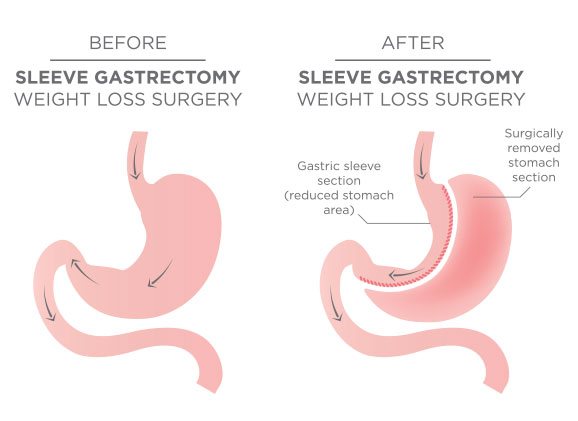We currently only offer the Safe Sleeve through our Fast Track program.
Please contact us for further information.
Bariatric Procedures
Your Bariatric Weight Loss Surgery Options
Procedures
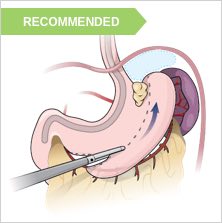
Safe Sleeve
Blossom Bariatrics Patented Safe Sleeve®
The Safe Sleeve procedure is our trademarked, patented technique for the way we perform the vertical sleeve gastrectomy. The Safe Sleeve technique creates a safety pocket increasing the space between the organs and…
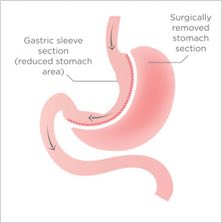
Gastric Sleeve
Gastric sleeve surgery is a restrictive type of procedure that permanently reduces the size of the stomach, thereby limiting food intake as well as the sensation of hunger. This procedure does not involve intestinal rerouting or malabsorption unless followed by Roux-en-Y gastric bypass and uses only the client’s own natural tissues.
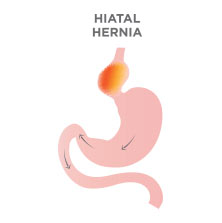
Hernia Repair
A hiatal hernia is a condition where the upper portion of your stomach bulges through the large diaphragm muscle separating your abdomen from your chest. This can happen to people of any age, size or gender. Most often this is the stomach but can include other intra-abdominal organs as well.
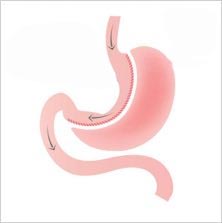
Gastric Revision
A weight loss surgery revision or revision weight loss surgery is a procedure that either fixes the issue with the current surgery or converts it to another procedure.
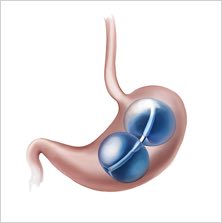
Gastric Balloon
We no longer offer this procedure due to medical reasons. Please consider our Safe Sleeve procedure.
The ReShape Procedure is an FDA approved, non-surgical approach to weight loss that is proven to help people achieve and maintain significant weight loss. The ReShape Procedure was specifically designed for patients with a lower BMI. In a clinical study, patients lost more than twice as much weight with ReShape than with diet and exercise alone…
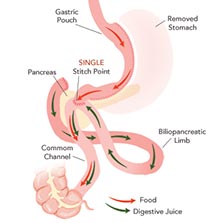
SIPS/Turbo Sleeve
The single-anastomosis duodenal switch, also called stomach intestinal pylorus sparing surgery (SIPS). Similar to the standard duodenal switch operation, except that the small intestine is only transected at the duodeum. The majority of the most stretchable portion of the stomach is permanently removed (as in a standard sleeve) but basic stomach…
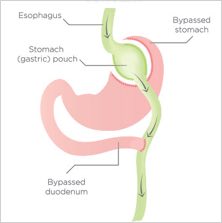
Gastric Bypass
According to the American Society Metabolic and Bariatric Surgery and the National Institutes of Health, Roux-en-Y (pronounced ROO-en-why) gastric bypass surgery has been historically the most popular bariatric surgery in the United States. During this malabsorption type procedure, Dr. Tom creates a small stomach pouch and then…
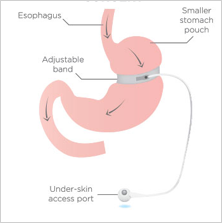
Adjustable Gastric Banding
We no longer perform this procedure, however we do perform band removals
Adjustable Gastric Banding (also known as Lap Band) is a purely restrictive surgical procedure in which a small band is placed around the uppermost part of the stomach. This band divides the stomach into two portions: one small and one larger portion. Since the stomach is divided into smaller parts, most of our Las Vegas Lap Band surgery clients…
FEATURED WEIGHT LOSS PROCEDURE
Compare Blossom Bariatrics Safe Sleeve® Procedure with the typical Gastric Sleeve
Over the years, Dr. Tom has perfected the Patented Safe Sleeve® - a unique and safer way to perform a vertical sleeve gastrectomy. The Safe Sleeve is performed laparoscopically and on an outpatient basis and only performed by Dr. Tom or his professionally trained surgeons at Blossom Bariatrics.

Have Questions? Get Answers.
Let your experts help you answer all your questions.

Common Questions about weight loss surgery
Weight loss surgery can be a difficult subject to learn all at once. Below are some commonly asked questions from the community.
At Blossom Bariatrics, we’ve put a great deal of time into helping people like you understand weight loss surgery and which procedure is right for you. Read our FAQ’s and visit our YouTube channel to learn everything you need to know about bariatric surgery.
What Kind of Results Can I Expect?
Each of the procedures available at Blossom Bariatrics are capable of delivering phenomenal results. Generally speaking, our clients will lose approximately 50 percent of their excess body weight during the first six to 12 months following treatment. In all cases, however, success is highly dependent on a client’s adherence to the postoperative instructions and lifestyle changes suggested by our surgeons and staff.
What is weight loss surgery recovery time?
Recovery time associated with bariatric surgery is generally minimal. Depending on the type of work, the majority of clients are able to return to work within one week following surgery. During the first two weeks post-op, clients may be asked to follow a strict liquid diet in order to allow the stomach to heal and then slowly progress from soft to solid foods.
How does bariatric surgery work?
There are two basic ways that bariatric surgery works to help clients lose weight and improve or resolve co-morbidities: (1) >malabsorption and (2) restriction. Our patented Safe Sleeve procedure uses the restriction method, and the outcome of the procedure is the same as a traditional gastric sleeve.
Both malabsorption and restriction procedures are considered highly effective and relatively safe. However, in some cases revision bariatric surgery might be necessary to remove a previously placed gastric band or enhance the results of gastric sleeve surgery. Our surgeons are highly experienced in performing revision bariatric surgery.
Malabsorption
Procedures that use malabsorption change the body’s ability to absorb calories and nutrients from food. The surgeon changes the way food travels through the client?s system. By rerouting food past a large part of the stomach and a portion of the small intestine, some of the calories and nutrients pass through without being absorbed.
Gastric Bypass surgery is considered a malabsorption type.
Weight loss surgery, as with all medical procedures, has certain risks, such as the necessity to undergo revision bariatric surgery. Clients should recognize that complications arise rarely and the vast majority of Dr. Tom’s clients are highly satisfied with their results.
Restriction
Procedures that use restriction limit the amount of food clients can eat. This is accomplished surgically by creating a small stomach pouch. When eating, the pouch fills quickly and gives a feeling of fullness much sooner. Because clients feel satisfied and full sooner, they eat less.
Restriction type bariatric surgeries include Gastric Sleeve and Adjustable Gastric Banding.
